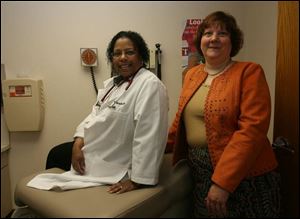
Doctors, lawyers partner to widen scope of healing
4/20/2008
Dianne Mantel, an attorney with Legal Aid of Western Ohio, right, and Dr. Kimberly Artis of St. Vincent Mercy Family Care Center team up to resolve children's health issues that go beyond a doctor's care.
Doctors often find themselves tracking problems far afield of medicine: issues such as whether their young patients have suitable living conditions or need educational assistance.
But physicians often don't know how to go about getting mold eradicated from an apartment or getting a child into a special education program, for example, so they tend to concentrate on medical treatments alone.
That is changing at St. Vincent Mercy Family Care Center, where a lawyer from Legal Aid of Western Ohio is on site to help doctors and to meet with low-income families having civil legal troubles. Such services also will be available within a few weeks at the University of Toledo Medical Center, formerly the Medical College of Ohio.
"Physicians don't tend to ask questions we don't have answers to," said Dr. Pamela Oatis, pediatric medical director of ethics and palliative care at St. Vincent Mercy Children's Hospital.
"Having the lawyer on site, working with us and teaching us about what questions to ask in order to find out what the shortfalls are is in the process of changing how we're doing medicine," Dr. Oatis said.
The Toledo Medical-Legal Partnership for Children, which includes the two Toledo hospitals, Legal Aid, and Advocates for Basic Legal Equality, started providing services about a year ago. The group was awarded more than $200,000 from the Marguerite d'Youville Foundation for the partnership program.
Discussions started in 2005, when both doctors and lawyers agreed that the concept made sense, said Dr. Elizabeth Ruppert, one of the main people who helped establish the program.
"It all just came together just very easy," said the UT medical college professor emeritus of pediatrics. "There was real energy to move this forward."
The nation's first medical-legal partnership was founded 15 years ago in Boston. There now are 72 partnership sites in the United States and Canada, with 15 more in development, according to the Medical-Legal Partnership for Children National Center in Boston.
The Toledo partnership was about the 30th nationwide to get started, and there are five in Ohio. Other Ohio sites include Cleveland, Chillicothe, Cincinnati, and Columbus, while Ann Arbor and Detroit each has one, according to the national center.
Dianne Mantel, a Legal Aid staff attorney, advises families on a variety of topics and represents them if needed. She recently was joined by L. Kate Mitchell, a Legal Aid attorney hired for the program. Two AmeriCorps attorneys also are helping, Ms. Mantel said.
Social services agencies often don't realize some problems families face are legal issues, and more than 90 percent of families helped so far have never sought help from Legal Aid, partnership officials said.
The partnership also is working on providing educational sessions for doctors, staff, and medical students.
Making sure children eligible for food stamps get them - to improve nutrition and growth - is one area where attorneys can help, Dr. Ruppert said. Families eligible for rent subsidies or low-rent housing is another, as is making sure children get health insurance so they are more likely to have regular doctor appointments, she said.
Said Dr. Oatis: "What we're doing on the legal end is ensuring that our families get the services they're legally entitled to get. We're not inventing anything."
One case that has been handled so far involved a child having trouble in school. The partnership had a full psychological test performed on the child, which determined the child was eligible for special education services such as additional help with reading.
Another family had mold removed from its subsidized apartment after the partnership became involved. And a child with spina bifida, who was denied Medicaid and had more than $4,000 in medical expenses, was reinstated in the state's insurance program, which paid for outstanding bills.
Though focused on children and pregnant women, the partnership also helps relatives, Ms. Mantel said. Family issues - such as domestic violence, caregiver custody, and insurance denials - affect everyone, she said.
Contact Julie M. McKinnon at:
jmckinnon@theblade.com
or 419-724-6087.